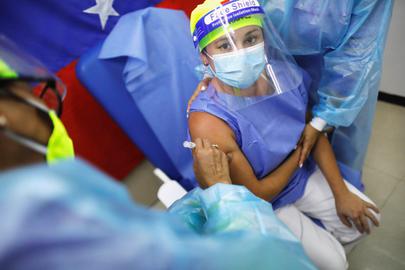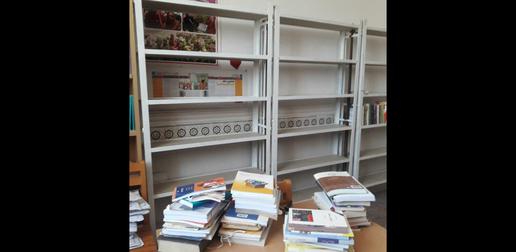This article is part of IranWire's ongoing coverage of Covid-19 disinformation in different countries, in partnership with Health Studio.
By Ximena Herrera for Health Studio
Many of the struggles facing Venezuela seem to hit the state of Zulia even harder, where entire weeks go by without water or electricity. The pandemic has been no exception, with Zulia becoming a Covid-19 hotspot last summer in large part because of limited healthcare supplies and water shortages.
Official figures show that Zulia has experienced the third-highest number of Covid-19 infections and the highest number of deaths compared to other parts of the country.
As the toll of Covid-19 has grown, the state has also become a target for disinformation spread by both news outlets and politicians. One claim made by politicians and shared in the media is that a new, deadlier “Zulia strain” is tearing through the state. But experts say that no such “strain” has been detected.
“ALARMING! The Governor of Zulia warned the detection of a strain of the most lethal Covid-19 in the state” read a title on news portal DolarToday in January: a distressing and misleading message that frightened many living in the state.
According to The Fake News Observatory of Venezuela, the origin of this message was a broadcast by Zulia Governor Omar Pietro, who in a mid-January episode of his “Omar at 7” television program said: “The Covid-19 that is attacking Zulia is worse and more lethal than we had in the first outpost. In 24 hours, the patient goes from moderate to severe and when these cases arrive, it is difficult to recover them. They should seek medical attention when the first symptoms appear.”
A version of the governor’s quote including the word “strain” was shared on messaging app WhatsApp by the Office of Information and Press of the State Executive (OIPEEZ). Venezuelan newspaper El Nacional picked up the story, which was repeated on DolarToday. Although DolarToday is known for sometimes spreading fake news, El Nacional is a well-respected publication.
New Variants
Experts say that claims of a new “Zulia strain” are mistaken for a number of reasons.
Dr Patricia Valenzuela, an infectious disease specialist and member of the Venezuelan Society of Infectology told the Observatory that it is firstly incorrect to talk about new “strains” of coronavirus. New versions of coronavirus that have been reported around the world since December 2020 are in fact “variants,” not new “strains.”
When SARS-CoV-2—the virus that causes Covid-19, multiplies—changes or “mutations” can appear in the new virus particles. These mutations are normal and expected, and most of them have little impact on the way the virus behaves. But sometimes, they can help the virus survive and spread.
It is from such mutations that the UK, South Africa and Brazil variants emerged. These variants have a significant number of mutations, and have been shown to spread more quickly than the “wild-type” or original virus. But Valenzuela explained there is no evidence to show the South Africa and Brazil variants are more lethal. Some early-stage research has suggested the UK variant may be more deadly, however.
New variants are identified using sophisticated genomic analyses. But Dr Sofía Isea from the La Trinidad Medical Teaching Center told Health Studio that Venezuela does not have the means to carry out such studies.
In fact, the country has struggled to keep up with demand for standard Covid-19 diagnostic tests. In July, El País reported that just one Venezuelan laboratory was performing polymerase chain reaction (PCR) tests: the National Institute of Hygiene located in Caracas, which is some 700km by car from Zulia. This lack of capacity left many Venezuelan patients waiting weeks for results.
Poor Resource Management
Well-known internist and infectious disease specialist Dr. Julio Castro told his social media followers that the devastating impact of Covid-19 on Zulia is not the result of a “more aggressive” virus, but rather of mismanagement.

Tweet reads: “I said it before and I repeat it: There are no ‘more aggressive’ or less aggressive viruses. What if there is bad management and good management. The virus acts in a stereotypical way, humans do not.”
It is no secret that the Caribbean country is experiencing one of the most difficult moments in its history. According to a report by The Washington Office on Latin America (WOLA), Venezuela was already facing a complex humanitarian crisis when Covid-19 hit, making it highly vulnerable to the pandemic. Zulia has been hit particularly hard by the country’s ongoing economic crisis—a factor experts say is key to understanding the impact of the disease in the state.
Dr Castro’s view is one shared by Dianela Parra, neurologist, and president of the College of Physicians of Zulia. Countering rumours of a more serious Covid-19 “variable” in the state last summer, she told human rights group Crisis en Venezuela that Zulia was in an extremely precarious condition when the disease hit.
She said the impact of the virus was worsened by the deprivation facing many people living in the state. Often-malnourished residents were unable to protect themselves because they did not have access to clean drinking water or soap in their homes—much less the ability to purchase a face mask.
Overwhelmed and Under-Resourced Hospitals
Ana Rosario Contreras, the president of the Board of Directors of the College of Nursing Professionals of the Capital District, told Health Studio that sanitation is also poor in many hospitals in Venezuela. She said, “80 percent of the hospitals do not have working plumbing. One of the most important things is to wash your hands, but that cannot be done if there is no water.”
Contreras said that Venezuela has a very high rate of Covid-19 deaths among health personnel, due in part to serious shortages of personal protective equipment. “A nurse must use [a single] N-95 masks for a whole week, [even though they] are designed for hours of use. There are no gloves. We have to collect money together to buy soap because we do not have it,” she said.
Viral videos show the pandemic has had a devastating impact on many hospitals in the country. Patients at Maracaibo’s University Hospital in Zulia have on numerous occasions expressed fears they will die of hunger or a lack of medicine. In August, The Guardian reported that patients were afraid they would be left to die on one of the hospital’s dedicated Covid-19 floors. A video shared by a Venezuelan journalist last summer purported to show that bodies of deceased patients were being left on wards for prolonged periods of time because of a lack of staff.
According to Efecto Cocuyo, the Zulia State Inter-union Health Coalition asked the government to declare a regional health emergency in November because of a rise in Covid-19 cases. The body also asked the municipalities to prohibit mass events, but authorities opted to continue using a “7-7” lockdown protocol, whereby a week of normal activities are followed by a week of quarantine.
Dissatisfaction with the Government
Nursing president Ana Rosario Contreras told Health Studio that the pandemic is being managed in a politically partisan way that benefits those in charge, rather than those in the most need. For example, when the first doses of Russian vaccine Sputnik V arrived in Venezuela, Vice President Delcy Rodriguez said on state television that these would go to “the most vulnerable sectors, the health workers.” Some of these doses, however, also went to officials and lawmakers.
This has angered many Venezuelans, who see the government as putting themselves before the society they have a legal duty to protect.
Although it has been hit particularly hard by the pandemic, there is no evidence to back up claims that a new, highly lethal coronavirus variant is tearing through Zulia. While the correct tools remain out of reach, Venezuelan scientists can’t be sure which variants are circulating in the country. What is evident, however, is how poor sanitation and underfunded hospitals have left Zulia particularly vulnerable to the devastating effects of the pandemic.
visit the accountability section
In this section of Iran Wire, you can contact the officials and launch your campaign for various problems


























comments